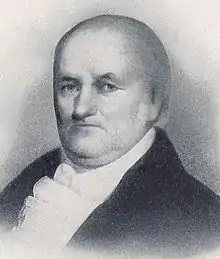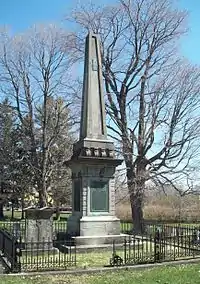Joseph Ellicott
Joseph Ellicott (November 1, 1760 in Bucks County, Pennsylvania – August 19, 1826 in New York City) was an American surveyor, city planner, land office agent, lawyer and politician of the Quaker faith.[1]
Joseph Ellicott | |
|---|---|
 | |
| Born | November 1, 1760 |
| Died | August 19, 1826 New York City, U.S. |
| Occupation | Surveyor, city planner, land office agent, lawyer and politician |
| Known for | Laying out Batavia and Buffalo; advocating Erie Canal |
| Parent(s) | Joseph Ellicott Judith Blaker |
| Relatives | Andrew Ellicott (brother) Benjamin Ellicott (brother) |
Life
Ellicott was born in Bucks County, Pennsylvania on November 1, 1760.[2] He was the son of Quaker miller Joseph Ellicott (1732–1780) and Judith Blaker (1729–1809). Joseph's siblings included older brother Andrew Ellicott (1754–1820), a fellow surveyor, and younger brother Benjamin Ellicott (1765–1827), a U.S. Congressman.[3]
Career
In 1790, his brother Andrew Ellicott was hired by the federal government to survey the new federal district, where the new capital city of Washington was to be built. Joseph was Andrew's chief assistant during the latter part of the survey. Joseph Ellicott was subsequently sent to Georgia to survey the boundary line, established by treaty with the Creek tribe.[4]
Holland Land Company
He was then engaged to survey some property in western Pennsylvania which has been purchased by a group of Dutch investors, who had formed the Holland Land Company. He also extended the New York - Pennsylvania border westward. When the company purchased a huge tract of western New York (that became known as The Holland Purchase), Ellicott was hired in 1797 and was sent to perform the monumental task of surveying it.[1] Ellicott spent two years (1798–1800) living outdoors in summer and winter, laying out the townships of the new land in order to complete the Great Survey of the land in October 1800.[5]
In 1800, the principal agent of the company, Paolo Busti, gave him a new position as their agent at their headquarters in Batavia, New York. From this office, for the next 21 years he supervised the sales of the tract, with his personal signature on many deeds. Ellicott was an observer for the investors at the Big Tree Treaty when the Senecas sold their rights to the land in Western New York.[6]
In 1801, he laid out Batavia, New York, and in 1804 the village of Buffalo, and established mill sites and communities.[7]
He advocated a canal to be built from the Hudson River to Lake Erie, and was among the Erie Canal Commissioners appointed in 1816 to supervise the canal construction, but resigned in 1818 due to ill health. The Erie Canal was finished in 1825. He also arranged for the contribution of more than 100,000 acres (400 km2) of company land to this project.[8]

As seller and land agent, Ellicott offered generous terms to the buyers, some of whom purchased farms for as little as 25 cents down. When some buyers could not make payments he often extended the terms and sometimes forgave interest if they had made improvements. He offered some selected parcels free upon condition that the buyer would establish a mill or an inn, to help stimulate growth in the area. In later years, Ellicott became the target of complaints by citizens who were unhappy with the land company.[9]
Ellicott was held responsible for the state of New York's decision not to buy up unsold land of the land company, and he retired in 1821. He then attempted to finance the purchase of the unsold land himself, but no one would join his venture, and he had to abandon the plan.[10]
Politics
Ellicott was a presidential elector in 1804, voting for Thomas Jefferson and George Clinton. From March 1806 to June 1807, he was First Judge of the Genesee County Court.
Personal life
Ellicott never married. His final years were marred by serious mental problems. Family members had him admitted to an asylum in New York City, where he died in 1826 by hanging himself. He was buried originally in that city, but was soon exhumed and re-buried in Batavia, New York at the Batavia Cemetery.[10]
At his death left an estate valued at about $600,000 (equivalent to $13,558,000 in 2019).
Legacy
Places named after Ellicott:[1][2]
- Ellicottville, New York - village and town in Cattaraugus County, New York.
- Ellicott, New York - town in Chautauqua County, New York.
- Ellicott Square Building - an office building in Buffalo, New York
- Ellicott Street - a street in downtown Buffalo, New York and another in downtown Batavia, New York.
- Ellicott Complex - a dormitory at the University at Buffalo.
- Ellicott Creek - a stream in Western New York.
- Ellicott Road - a road in Orchard Park, NY.
- Ellicott Elementary School - an elementary school in Orchard Park, NY
- Ellicott Run at Sinnemahoning State Park in Grove Township, Cameron County, Pennsylvania. He also laid out the Caledonia Pike in Cameron & Elk Counties, Pennsylvania.
- Ellicott Mall - A housing project in Buffalo, NY
References
- Notes
- Mingus, Nancy Blumenstalk (2003). Buffalo: Good Neighbors, Great Architecture. Arcadia Publishing. p. 18. ISBN 9780738524498. Retrieved January 22, 2018.
- Hammill, Luke (January 22, 2018). "The Buffalo of Yesteryear: Why the name 'Ellicott' is ubiquitous in Western New York". The Buffalo News. Retrieved January 22, 2018.
- Henry K. Sharpe. The Patapsco River Valley. p. 9.
- Buffalo Historical Society Publications. Bigelow Brothers. 1922. p. 28. Retrieved January 22, 2018.
- Chazanof, William (1970). Joseph Ellicott and the Holland Land Company: the opening of western New York. Syracuse University Press. pp. 214–219. Retrieved January 22, 2018.
- Silsby, Robert W. (1961). The Holland Land Company In Western New York, Vol. VIII. Buffalo and Erie County Historical Society. Retrieved January 22, 2018.
- Cutter, William Richard (1912). Genealogical and Family History of Western New York: A Record of the Achievements of Her People in the Making of a Commonwealth and the Building of a Nation. Lewis Historical Publishing Company. pp. 1466–1467. Retrieved January 22, 2018.
- Smith, Henry Perry (1884). History of the City of Buffalo and Erie County: With ... Biographical Sketches of Some of Its Prominent Men and Pioneers ... D. Mason & Company. p. 25. Retrieved January 22, 2018.
- LaChiusa, Chuck. "Joseph Ellicott". www.buffaloah.com. Buffalo Architecture and History. Retrieved January 22, 2018.
- Robert T. Englert (August 2001). "National Register of Historic Places Registration: Batavia Cemetery". New York State Office of Parks, Recreation and Historic Preservation. Archived from the original on August 7, 2012. Retrieved June 14, 2009.
- Sources
- Brief information on Ellicott
- Biography of Joseph Ellicott
- The New York Civil List compiled by Franklin Benjamin Hough (pages 40 and 360; Weed, Parsons and Co., 1858)
- Linklater, Andro (2007), The fabric of America: how our borders and boundaries shaped the country and forged our national identity, Walker & Co., ISBN 9780802715333
External links
- "The Holland Land Company in Western New York", by Robert W. Silsby, Buffalo and Erie County Historical Society, Adventures in Western New York History, volume VIII, 1961, (provides account of Joseph Ellicott, downloadable from http://bechsed.nylearns.org/, click on Adventures in WNY History)
- Joseph Ellicott and the Holland Land Company bibliography of books and manuscripts in the library collection at the Buffalo and Erie County Historical Society.